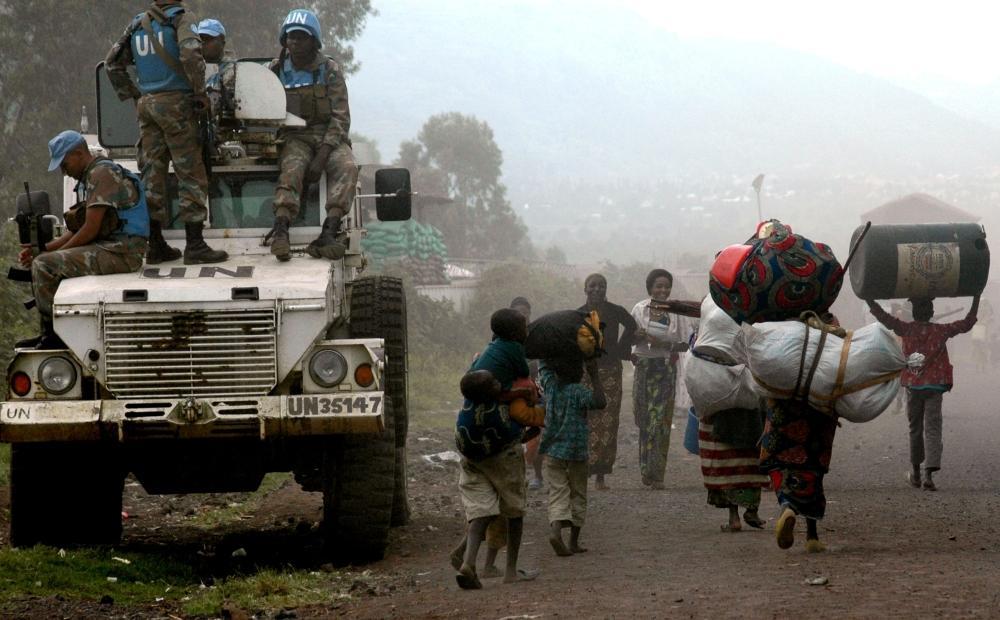Africa-Press – Rwanda. The final report of the UN Group of Experts on DR Congo has finally been made public. While somewhat toned down compared to the incendiary leaked draft, which openly accused Rwanda of planning to annex parts of DR Congo, it remains riddled with the same misinformation, mischaracterisations, incoherence, and unmistakable biases against Rwanda and the AFC/M23 rebels as in previous reports. As a result, the report’s conclusions bear little resemblance to established facts and are often contradicted by the experts’ own allegations.
UN experts open with a bold claim: “AFC/M23 did not show a genuine commitment to a negotiated settlement of the crisis.” Their sole evidence for this assertion is the rebel group’s stated refusal to vacate territories under its control.
“AFC/M23 would not leave the occupied areas, whatever the outcome of the negotiations,” the experts write. Why they choose to present the withdrawal of AFC/M23 from liberated areas as the only acceptable outcome of negotiations remains unclear. It should be clear to all, especially to self-styled experts in conflict, that the purpose of negotiations is not to grant Kinshasa what its military has failed to achieve by force.
When a party rejects dialogue, as Kinshasa has done since the beginning of the conflict in late 2021, breaks a ceasefire imposed by the EAC, and opts for violence through a plethora of state and non-state actors, and subsequently loses territory, negotiations are not a vehicle to reclaim what was lost. They are, rather, a means for former foes to reach an understanding—to coexist. But predictably, the experts’ position mirrors that of the Congolese government. And coincidentally, Kinshasa’s clear reluctance to engage in dialogue with the rebels, its refusal to release political prisoners linked to the rebels, its unwillingness to lift the freeze on banking activities in rebel-controlled areas, and its continued military buildup in South Kivu Province are not interpreted by the experts as evidence of Kinshasa’s lack of commitment to a negotiated settlement. The experts’ bias against AFC/M23 was already apparent; they are simply less discreet about it now.
The experts proceed to contradict themselves. On the one hand, they claim that “RDF military engagements did not primarily aim at neutralizing the FDLR or halting an alleged existential threat posed to Rwanda,” but rather sought to conquer territory and enable AFC/M23 to consolidate control. On the other hand, seemingly oblivious to the cognitive dissonance inherent in their own narrative, the same experts assert that “AFC/M23 control over eastern DRC decimated FDLR ranks.”The UN-sanctioned genocidal militia formed by remnants of the architects of the 1994 Genocide against the Tutsi in Rwanda, FDLR, and its splinter groups have camped in eastern DR Congo for close to three decades, wrecking havoc, with impunity.
Elsewhere in the report, they claim that “the intense fighting during the AFC/M23 and RDF assaults on Sake, Mubambiro, and Goma inflicted heavy losses on VDP/Wazalendo and FDLR forces.” In yet another paragraph, they write: “Under constant RDF and AFC/M23 threat, the FDLR was also forced to decamp from Mianja and Lukweti, traditional FDLR strongholds hosting important FDLR training centres.”
The experts’ incoherence is, for lack of a better word, mind-blowing.
Rwanda and the AFC/M23 are allegedly not primarily targeting FDLR, yet somehow the Kinshasa-backed genocidal militia keeps fleeing from its strongholds. Remarkable! How did RDF operations manage to achieve something they were supposedly not intended to achieve?
How is AFC/M23’s territorial control and consolidation somehow disconnected from the objective of neutralising FDLR? And how does one separate Rwanda’s alleged support for the AFC/M23 from its stated security concerns, when that very support is demonstrably weakening the existential threat posed by the genocidal militia?
The only plausible explanation for why the experts’ conclusions do not follow from their own allegations is that the conclusions were pre-written, to begin with. So, even after admitting that the genocidal militia has been seriously hammered, the experts still manage to cling— heroically! —to their narrative that Rwanda’s grand plan is to annex Congolese territory and loot its minerals. Coherence, clearly, is not a requirement for expertise.
The experts also engage in misinformation and mischaracterisation of events. Take, for example, the widely publicised rebel raids on hospitals in Goma. The report states: “The continued presence of hors de combat elements does not render a hospital a legitimate military target.” This is a curious statement, to say the least, especially considering that no hospital was bombed into oblivion, as is often the case when Western “democracies” conduct military operations (the same democracies for whom this report seems intended).
As the experts themselves acknowledge, the rebels’ raids targeted FARDC, Wazalendo, and FDLR combatants who had not surrendered and were hiding in three different hospitals: Heal Africa, CBCA Ndosho, and Kyeshero. In only one instance, at Kyeshero, and under circumstances that remain unclear, gunfire was reportedly opened within the hospital grounds, resulting in one death and two injuries.
How the experts interpret these actions as treating hospitals as legitimate military targets defies reason. The hospitals are still standing, continue to operate, civilians were not targeted, and only combatants were arrested. There is no evidence that medical care was denied to people in need. Had the experts demonstrated that wounded combatants were deprived of treatment following relocation, their criticism might carry some weight. But even then, AFC/M23’s actions would still not amount to treating hospitals themselves as military targets.
Moreover, no provision of international law prohibits the arrest of hors de combat individuals hiding in hospitals. On the contrary, such actions enhance the safety of civilian staff and patients. In this case, the operations even led to the arrest of FDLR members, including the high-profile commander ‘Brig-Gen’ Ezechiel Gakwerere, according to the report. That seems more like a contribution to security than a war crime, but perhaps that doesn’t fit the experts’ narrative.
One could go on endlessly listing the report’s incoherences and misleading claims. But at its core, the report appears to serve three main objectives. First, to portray AFC/M23 as an entity under Rwanda’s total control—a claim for which the experts offer no substantial evidence, relying instead on hearsay and anonymous sources. Second, to accuse the rebels of committing war crimes and to use those accusations as a basis for threatening Rwanda with sanctions, on the grounds that Kigali exercises operational command and control over the rebel group, especially if it refuses to withdraw from major cities it captured. Third, to dismiss Rwanda’s security concerns by reframing its involvement as driven by darker motives, such as territorial expansion and mineral looting. Interestingly, the experts fail to explain how Rwanda could realistically pursue such grand ambitions while allegedly deploying a mere 1,000 to 1,500 troops, according to their own latest assessment.
Once again, the experts’ conclusions do not follow from the evidence presented because they were never meant to. They were predetermined. The experts’ commitment to a discredited narrative of bad guys (Rwanda and AFC/M23) bullying a poor victim (DR Congo) also explains why not a single one of their 21 recommendations offers any guidance on how to halt Kinshasa’s collaboration with FDLR or how to neutralise this genocidal outfit. None of the recommendations even mention the FDLR.
Think about that. Is it really paranoia to suggest that the perpetuation of violence and conflict serves the interests of the experts themselves and those of their paymasters?
For More News And Analysis About Rwanda Follow Africa-Press






